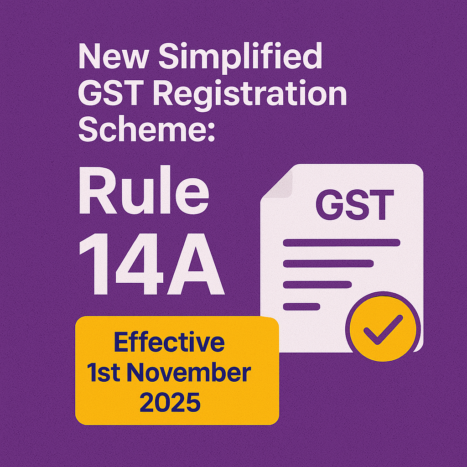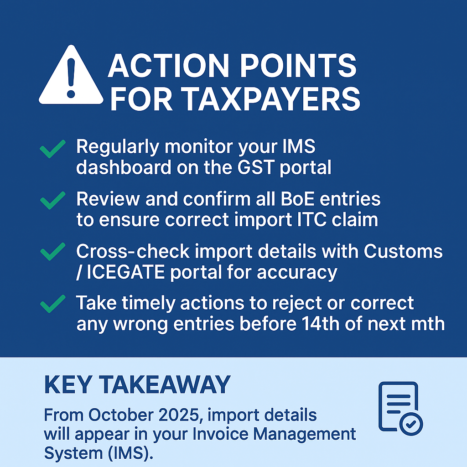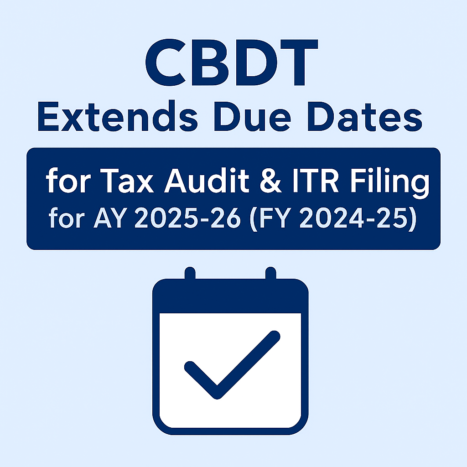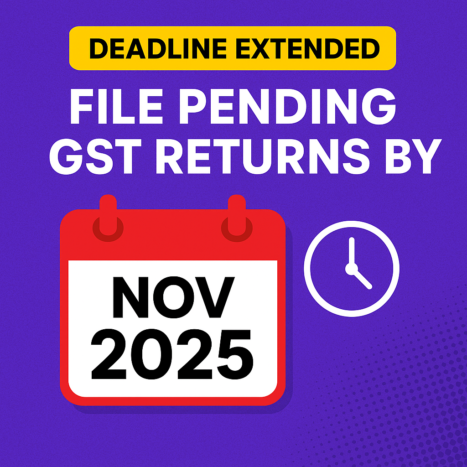GST Registration Made Faster! Small Businesses Can Now Get GST Number Within 3 Days Under New Rule 14A
🧾 Simplified GST Registration Under Rule 14A (Effective from 1st November 2025)
Starting 1st November 2025, the Government has rolled out a streamlined GST registration process under Rule 14A of the CGST Rules, 2017 — designed to make registration quicker and more efficient for small and low-risk businesses.
Under this new mechanism, eligible applicants can now receive auto-approval of their GST registration within 3 working days, significantly cutting down on manual scrutiny and long processing times.
🔍 Understanding Rule 14A
Rule 14A introduces a simplified and optional registration pathway for businesses whose monthly Input Tax Credit (ITC) to be passed on is ₹2.5 lakh or less.
When applying for GST registration, applicants will now see a new choice on the GST portal:
👉 “Apply under Rule 14A – Yes / No”
Selecting “Yes” enables the applicant to register through the fast-track approval system, ensuring quicker processing and minimal manual intervention.
🧾 Purpose Behind Rule 14A
The Rule 14A Scheme has been introduced with the following objectives:
- ⚡ Speed up GST registration by simplifying procedures and reducing waiting time.
- 🎯 Prioritize scrutiny only for high-risk or suspicious registrations.
- 🤝 Support small and genuine businesses by offering hassle-free registration.
- 🚀 Enhance ease of doing business and cut down compliance pressure for startups and MSMEs.
🧑💼 Who Can Apply Under Rule 14A?
You are eligible for registration under this scheme if you meet all of the following criteria:
-
💰 The total ITC to be passed on does not exceed ₹2.5 lakh per month.
-
🧾 Your business is classified as low-risk by the GST system analytics.
-
✅ Aadhaar verification of the applicant has been successfully completed.
-
🆕 The application is for a new GST registration, not for modification or re-registration.
📌 Note: Choosing Rule 14A is optional. Businesses with higher ITC or complex operations can continue with the standard registration process.
⚙️ Salient Features of the Revised GST Registration Process
| Particulars | Earlier System | New Rule 14A System |
|---|---|---|
| ⏱️ Processing Time | Up to 7 working days (may extend if verification needed) | Auto-approval within 3 working days for eligible applicants |
| 🏢 Physical Verification | Conducted frequently | Required only if system flags risk |
| 💰 Eligibility Limit | No fixed threshold | Applicable when ITC to be passed ≤ ₹2.5 lakh/month |
| 🪪 Aadhaar Authentication | Optional in some cases | Compulsory for all applicants |
| 👥 Target Applicants | All categories of taxpayers | Small and low-risk businesses |
| 🔎 Scrutiny Level | Standard departmental review | Limited scrutiny through system-based checks |
📌 Steps to Apply under Rule 14A
1️⃣ Visit the GST Portal and open the New Registration (Form Part A) section.
2️⃣ Select “Yes” when prompted — “Do you want to register under Rule 14A?”
3️⃣ Complete Aadhaar authentication instantly using OTP verification.
4️⃣ Fill in all required details — business, bank account, place of business, and upload supporting documents.
5️⃣ Once submitted, your application will be auto-approved within 3 working days, provided you meet eligibility conditions.
6️⃣ If you choose “No”, your registration will proceed through the standard verification and approval route.
🧮 Example
Suppose Ms. Neha plans to open a small garment wholesale business with projected monthly sales of ₹ 12 lakh, primarily supplying to registered buyers (B2B).
Her output GST liability on these sales comes to about ₹ 2.1 lakh per month.
Because the ITC passed on is below ₹ 2.5 lakh per month, Ms. Neha qualifies for registration under Rule 14A.
After completing Aadhaar verification, her GST registration will be auto-approved within 3 working days, without any physical verification.
⚠️ Important Things to Remember
- Aadhaar authentication is compulsory to avail this simplified registration route.
- The ₹ 2.5 lakh limit applies only to ITC passed on, not to overall turnover or sales.
- This facility is meant only for fresh registrations, not amendments or re-registrations.
- If your ITC later exceeds ₹ 2.5 lakh per month, your account may move to the standard verification process.
- While registration is faster, all regular GST compliances—such as return filing, invoicing, payments, and audits—remain mandatory.
- Any false declaration or misuse of this scheme can result in cancellation of GSTIN or further departmental scrutiny.
💡 Why Rule 14A Is Important
The introduction of this rule highlights the government’s focus on:
- Streamlining GST registration for honest and compliant small businesses.
- Leveraging data analytics to identify and fast-track low-risk applicants.
- Enhancing compliance efficiency while cutting down manual delays and intervention.
- Empowering startups and MSMEs by promoting faster onboarding and greater ease of doing business.
📅 Effective Date
The simplified GST registration system under Rule 14A will come into effect from 1st November 2025.
New applicants registering on or after this date can choose this route if they meet the eligibility criteria for small or low-risk businesses.














 MCA — Extension for Annual Filings & DIR-3 KYC
MCA — Extension for Annual Filings & DIR-3 KYC Practical Tip:
Practical Tip: File your Director KYC before 31st October to avoid the ₹5,000 late fee.
File your Director KYC before 31st October to avoid the ₹5,000 late fee. Income Tax — Extension Expected for Audit & ITR Filing
Income Tax — Extension Expected for Audit & ITR Filing GST — Possible Extension for GSTR-3B (September 2025 Period)
GST — Possible Extension for GSTR-3B (September 2025 Period) TDS, TCS & Other Key Compliance Due Dates (October 2025)
TDS, TCS & Other Key Compliance Due Dates (October 2025) Due Date
Due Date Compliance
Compliance